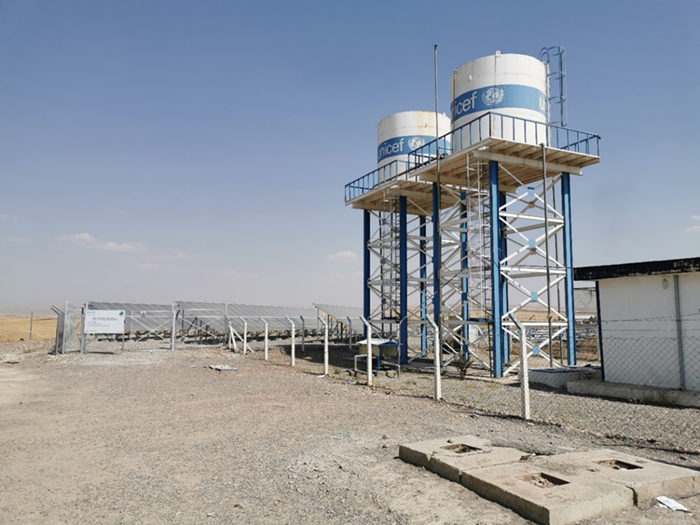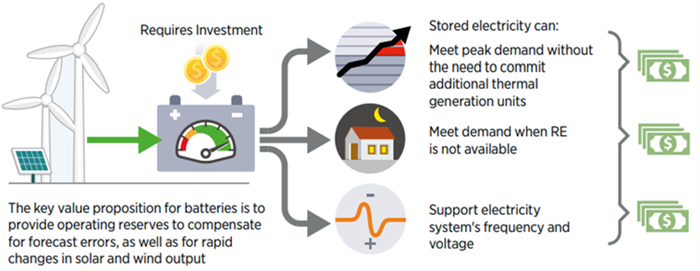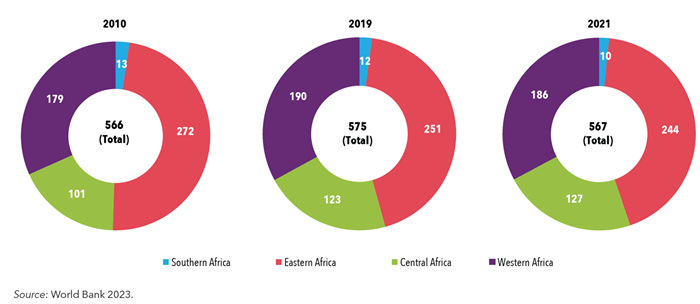Flexibility assessments
Electricity Access
Although access to electricity has advanced more rapidly in recent years compared to previous decades, it remains a critical issue. According to Tracking SDG7: The energy progress report, in 2021 around 675 million people worldwide still did not have access to electricity. Hence, the deployment of sustainable and low-carbon electrification solutions are crucial, both to achieve universal access for all (SDG 7) and fulfil the Paris Agreement. Of the current population living without access to electricity in the world’s, more than 80 percent of the world’s unserved lived in Sub-Saharan Africa in 2021.
Energy access remains one of the most problematic issues in the context of humanitarian crises. Electricity for basic lighting and charging of essential equipment is needed in such situations. Widespread access to clean, fuel-efficient cooking stoves can improve the health and safety of displaced people, most of whom rely on unsustainable energy resources that pose risks to their safety and security. Therefore, access to clean and sustainable energy can deliver rapid returns in humanitarian settings and significantly contribute to achieving the UN Sustainable Development Goals. With the numbers of displaced people and refugees reaching unprecedented levels (more than 25 million refugees in 2019), achieving energy access has become ever more important.
To this end, IRENA and the UN Refugee Agency (UNHCR) are working together to promote the use, increased uptake and replicability of renewable energy solutions as cost-effective and environmentally sound options in situations of displacement and other similar humanitarian settings. Under this arrangement, IRENA released a study at the Global Refugee Forum in December 2019 to assess energy usage in four refugee camps in Iraq and Ethiopia, and to devise a blueprint for providing more reliable and affordable energy supplies using renewables.

IRENA is expanding its work to cover all energy transition pathways. Among them is a key pathway for the power sector transformation, namely the provision of energy access through the deployment of off-grid renewable energy solutions.
Roadmaps for islands and SIDS
IRENA works with Members on the techno-economic assessment for mini-grids in rural areas and renewable energy roadmaps for isolated power systems such as those of Small Island Developing States (SIDS). These look not only at the power sector, but also Power-to-X options such as electric vehicles and hydrogen.
Among technologies, battery storage systems are essential to achieving 100% renewable energy in SIDS. They provide services to increase the electricity system's reliability and support renewable energy integration. Furthermore, stored electricity can meet peak demand without other system assets, support system voltage and frequency, and balance the energy supply when renewables are not available.

Roadmaps have been developed for:
Support has also been provided for the development of roadmaps for:
- Tonga
- Nauru
- Mauritius
100% roadmaps that cover road transport and consider green hydrogen as a way to provide seasonal storage of renewables have been developed for
Geospatial electrification planning for universal access in West Africa
The latest Tracking SDG7 report of 2023, shows that about 40% of Sub Saharan African (SSA) countries do not have official electrification plans and only about 22% have set electrification targets at least as ambitious as SDG indicator 7.1.1. This raises concerns about the efforts towards universal access goals. Besides, West Africa emerges as the second-largest region in Africa with limited access to electricity, accounting for 30% of its population (567 million) without light in 2021.

Moreover, it is recognized that closing the existing gaps in electricity access would require not only expanding the main power grid but also leveraging off-grid technologies. These technologies can be deployed in areas where it is technically and economically unfeasible to extend the centralized grid. According to the World Bank report in 2023, up to half a billion people could be supplied by mini-grids to achieve universal access to electricity by 2030, with a significative shared of them based supplied by solar-PV combined with battery storage. The advantages of such systems are the ability to balance excess production from solar PV to be utilised at time of high demand, and the possible displacement of diesel generators, leading to fuel-related cost savings.
Given this background, IRENA has developed a West-Africa electrification platform to assist members countries in the region, namely Burkina-Faso, Mali, Nigeria and Senegal, in their efforts towards SDG7. This platform explores several pathways to universal access and showcases the role of battery storage in mini grids.

The platform shows possible pathways towards universal access to electricity by offering various functionalities, including:
- Exploring cost-optimal pathways to universal access in 4 countries and subject to different assumptions on electricity demand, grid expansion and mini-grid cost.
- Identifying potential markets & screen suitable sites for off-grid expansion using specific filters.
- Showing scenario results until 2030, with intermediate step in 2025.
- Indicating cost-effective technologies, technical details and associated costs for each settlement.
- Analyzing cost savings from battery storage in hybrid mini grids.
The platform is open-access and accessible here. The synthesis report from the analysis will be available shortly.